Related Research Articles
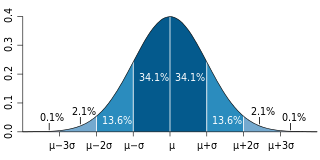
Independence is a fundamental notion in probability theory, as in statistics and the theory of stochastic processes. Two events are independent, statistically independent, or stochastically independent if, informally speaking, the occurrence of one does not affect the probability of occurrence of the other or, equivalently, does not affect the odds. Similarly, two random variables are independent if the realization of one does not affect the probability distribution of the other.

The South West Africa People's Organisation, officially known as the SWAPO Party of Namibia, is a political party and former independence movement in Namibia. Founded in 1960, it has been the governing party in Namibia since the country achieved independence in 1990. The party continues to be dominated in number and influence by the Ovambo ethnic group.

Pan-Africanism is a worldwide movement that aims to encourage and strengthen bonds of solidarity between all indigenous and diasporas of African ancestry. Based on a common goal dating back to the Atlantic slave trade, the movement extends beyond continental Africans with a substantial support base among the African diaspora in the Americas and Europe.

The World Association of Community Radio Broadcasters is the international umbrella organization of community radio broadcasters founded in 1983, with nearly 3,000 members in 110 countries. Its mission is to support and contribute to the development of community and participatory radio along the principles of solidarity and international cooperation.
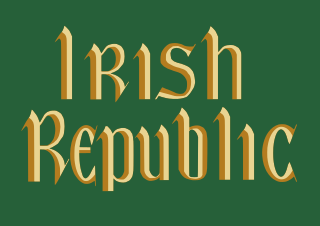
Cumann na mBan, abbreviated C na mB, is an Irish republican women's paramilitary organisation formed in Dublin on 2 April 1914, merging with and dissolving Inghinidhe na hÉireann, and in 1916, it became an auxiliary of the Irish Volunteers. Although it was otherwise an independent organisation, its executive was subordinate to that of the Irish Volunteers, and later, the Irish Republican Army.

African nationalism is an umbrella term which refers to a group of political ideologies in sub-Saharan Africa, which are based on the idea of national self-determination and the creation of nation states. The ideology emerged under European colonial rule during the 19th and 20th centuries and was loosely inspired by nationalist ideas from Europe. Originally, African nationalism was based on demands for self-determination and played an important role in forcing the process of decolonisation of Africa. However, the term refers to a broad range of different ideological and political movements and should not be confused with Pan-Africanism which may seek the federation of several or all nation states in Africa.

The Estonian Defence League is a voluntary national defence paramilitary organization of the Republic of Estonia, under management of the Ministry of Defence. Its aim is to guarantee the preservation of the independence and sovereignty of the state, the integrity of its land area and its constitutional order.
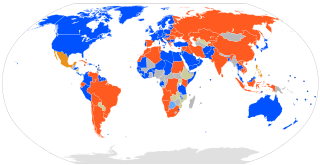
International recognition of Kosovo, since its declaration of independence from Serbia enacted on 17 February 2008, has been mixed, and international governments are divided on the issue. The Government of Serbia does not diplomatically recognise Kosovo as a sovereign state, although the two countries have enjoyed normalised economic relations since 2020 and have agreed not to try to interfere with the other's accession to the European Union.

The Alliance Party was a political coalition in Malaysia. The Alliance Party, whose membership comprised United Malays National Organisation (UMNO), Malaysian Chinese Association (MCA) and Malaysian Indian Congress (MIC), was formally registered as a political organisation on 30 October 1957. It was the ruling coalition of Malaya from 1957 to 1963, and Malaysia from 1963 to 1973. The coalition became the Barisan Nasional in 1973.
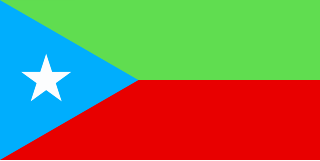
Baloch nationalism is an ideology that asserts that the Baloch people, an ethnic group native to Pakistan, Iran and Afghanistan form a distinct nation. The origins of modern Baloch nationalism coupled with the insurgency in Balochistan involoving various militant organizations, go back to the period of the partition of British India and subsequent independence of Pakistan, when Kalat, the largest Baloch princely state, acceded to the Dominion of Pakistan.
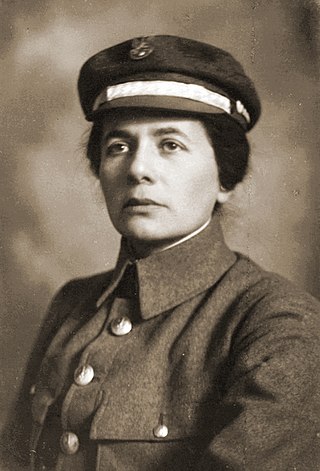
Lt. Col. Aleksandra Zagórska, firstly, Bitschan, secondly, Zagórska, aka Aleksandra Bednarz – was a lieutenant colonel in the Polish Armed Forces, a soldier in the Legions, organizer and commandant of the Ochotnicza Legia Kobiet and an independence activist.

The International Socialist Group was a revolutionary socialist organisation based in Scotland which was formed in April 2011 by former members of the Socialist Workers Party. The group produced a free monthly broadsheet and online blog, Communiqué. The ISG participated in a number of campaigns, such as the Coalition of Resistance, Stop the War Coalition and the Radical Independence Campaign. In 2015 the ISG formally dissolved with its members participating in the Scottish Left Project, the organisational process which led to the RISE electoral alliance to contest the 2016 Scottish Parliamentary elections alongside Scottish Socialist Party, individuals from the Radical Independence Campaign and other activists and trade unionists.
Yes Scotland was the organisation representing the parties, organisations, and individuals campaigning for a Yes vote in the 2014 Scottish independence referendum. It was launched on 25 May 2012 and dissolved in late 2014 after Scotland voted against independence.

Women for Independence is a grass-roots political organisation which seeks to improve the representation of women in public and political life throughout Scotland. Founded in 2012, the movement promotes the causes of Scottish independence and other constitutional changes they consider likely to contribute to greater democracy, gender equality and social justice. The organisation's full name is Women for Independence – Independence for Women.

The feminist movement in Malaysia is a multicultural coalition of women's organisations committed to the end of gender-based discrimination, harassment and violence against women. Having first emerged as women's shelters in the mid 1980s, feminist women's organisations in Malaysia later developed alliances with other social justice movements. Today, the feminist movement in Malaysia is one of the most active actors in the country's civil society.
Foreign aid for gender equality in Jordan includes programs funded by governments or non-governmental organizations (NGOs) that aim to empower women, close gender based gaps in opportunity and experience, and promote equal access to education, economic empowerment, and political representation in the Hashemite Kingdom of Jordan.
The Women's suffrage movement in India fought for Indian women's right to political enfranchisement in Colonial India under British rule. Beyond suffrage, the movement was fighting for women's right to stand for and hold office during the colonial era. In 1918, when Britain granted limited suffrage to women property holders, the law did not apply to British citizens in other parts of the Empire. Despite petitions presented by women and men to the British commissions sent to evaluate Indian voting regulations, women's demands were ignored in the Montagu–Chelmsford Reforms. In 1919, impassioned pleas and reports indicating support for women to have the vote were presented by suffragists to the India Office and before the Joint Select Committee of the House of Lords and Commons, who were meeting to finalize the electoral regulation reforms of the Southborough Franchise Committee. Though they were not granted voting rights, nor the right to stand in elections, the Government of India Act 1919 allowed Provincial Councils to determine if women could vote, provided they met stringent property, income, or educational levels.
The Nairobi People's Convention Party (NPCP) was a Nairobi based political party formed in 1957 by Tom Mboya. This party played a crucial role in the fight for Kenya's independence. Despite attempts at suppression from the colonial government, the NPCP managed to mobilise Africans in Nairobi to further the nationalist cause and fight for independence from Britain. Following Jomo Kenyatta's release from detention in 1961, the NPCP merged with the Kenya African Union (KAU) and Kenya Independence Movement (KIM) to form the Kenya African National Union (KANU).

Irena Kosmowska was a Polish educator and politician. She was one of the first group of women elected to the Legislative Sejm in 1919, serving in parliament until 1930.
References
- Aneta Górnicka-Boratyńska: Chcemy całego życia. Antologia polskich tekstów feministycznych z lat 1870–1939. Warszawa: 1999.
You can help expand this article with text translated from the corresponding article in Polish. (May 2018)Click [show] for important translation instructions.
|